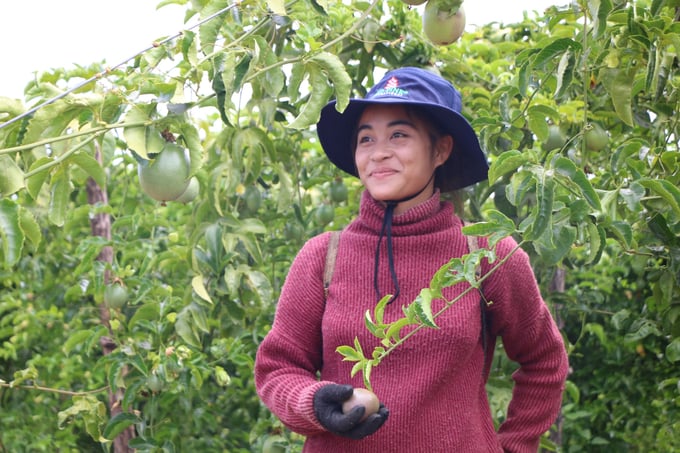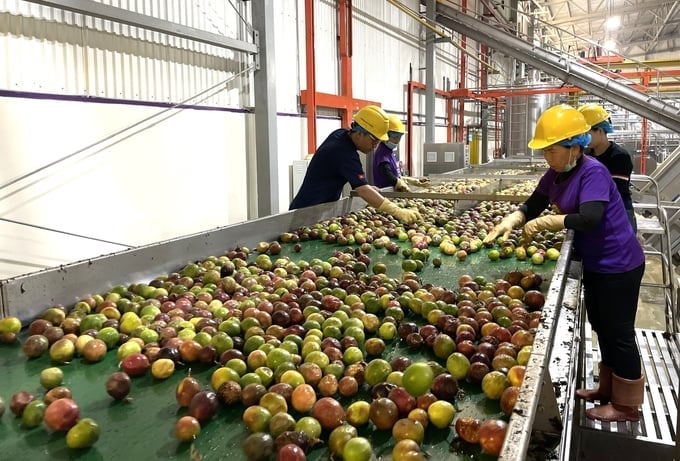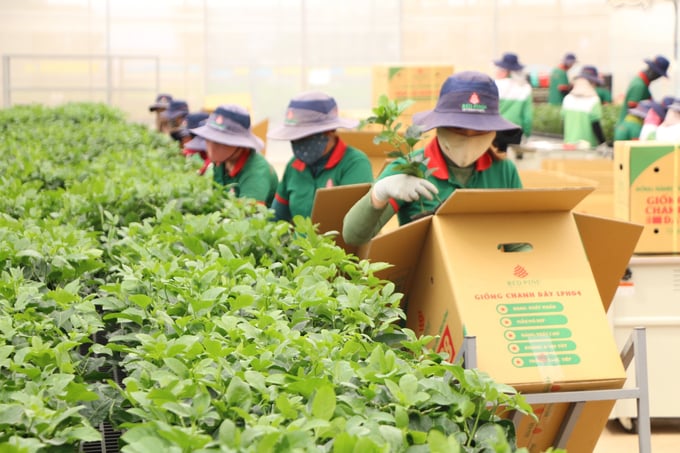May 25, 2025 | 15:05 GMT +7
May 25, 2025 | 15:05 GMT +7
Hotline: 0913.378.918
May 25, 2025 | 15:05 GMT +7
Hotline: 0913.378.918

Passion fruit is emerging as a key crop in Gia Lai province, and the Central Highlands region as a whole. Photo: Tuan Anh.
Passion fruit is a popular choice of produce around the world thanks to its fresh taste and versatile application in the beverage industry. Reportedly, global demand for Vietnamese fresh passion fruit reaches several hundred thousand tons annually, with concentrated passion fruit juice comprising approximately over 30,000 tons per year.
However, global passion fruit production saw a significant decline due to the adverse effects of harsh weather conditions from late 2023 to early 2024. Notably, the production of passion fruit in South American countries is facing extreme difficulty as a result of the severe weather conditions and prolonged droughts. Consequently, the passion fruit output of the South American region is gradually losing its competitive advantage.
On the other hand, Vietnam's passion fruit production has also experienced a partial decline due to adverse price fluctuations in 2023. Additionally, competition from other agricultural products has discouraged farmers from replanting passion fruit, resulting in the reduction of passion fruit production areas and a significant decrease in output.

Factories' demand for passion fruit is on the rise. Photo: Tuan Anh.
According to market reports, global demand for passion fruit is steadily increasing, whereas consumption levels are rapidly failing. In addition, the rising popularity of purple passion fruit worldwide presents an opportunity for Vietnam's passion fruit industry to extend its market reach. Despite being recognized as the passion fruit capital of the country, the Central Highlands region is currently unable to fully meet the processing demand of local factories.
With the rise in demand, passion fruit prices have increased significantly since late 2023. In addition to price surges, passion fruit production has exhibited signs of a robust recovery in the near future. Industry experts anticipate that the the 2024-2025 passion fruit crop will generate substantial profits due to the increase in both price and yield. As a result, passion fruit farmers can capitalize on this opportunity by planting their crops with strategic timing.
With its short growth cycle, rapid capital turnover, and year-round fruiting, passion fruit trees are expected to yield high economic returns for farmers in the near future. Notably, passion fruit trees exhibit strong adaptability and robust growth under the climatic and soil conditions of Vietnam, and specifically within the provinces of the Central Highlands.

With a substantial annual processing capacity, Quicornac factory provides a stable output for local farmers. Photo: Tuan Anh.
As the leading region in passion fruit production nationwide, Gia Lai province plans to expand its production area to 20,000 hectares by 2025. Concurrently, Gia Lai is focusing on improving quality and enhancing processing to expand its target export market range.
Passion fruit has been designated as one of the four key export fruits of Gia Lai province alongside bananas, avocados, and durians. Following setbacks experienced during the previous passion fruit, local farmers have adopted a more cautious approach. Consequently, several households have opted for intercropping passion fruit with long-term crops to mitigate risks. For many households in Gia Lai province, passion fruit trees continue to offer significant economic returns when market demand is effectively understood and addressed.
In addition to a large raw material area, Gia Lai province has convinced numerous businesses to invest in local fruit processing plants.
Located within Gia Lai province, Quicornac's fruit processing plant has the capacity to process several thousand tons of fresh passion fruit every year. However, this figure is modest in comparison to global demand.
Quicornac's fruit processing plant is currently producing a wide range of processed passion fruit products, including frozen concentrated passion fruit juice, frozen purified passion fruit juice, and natural passion fruit aroma. These products are packaged in various forms according to customer requirements. Quicornac's processed passion fruit products have been distributed to over 40 countries worldwide, including demanding markets such as Japan, France, the United States, the Netherlands, and the United Kingdom.
According to Quicornac, its substantial procurement and processing capacity is able to maintain stable year-round consumption markets for the residents of Gia Lai province, the Central Highlands and other production areas nationwide.

Red Pine Company provides a high-quality passion fruit variety to support farmers' production. Photo: Tuan Anh.
With the aim of supporting sustainable passion fruit production, Gia Lai province houses a High-Quality Passion Fruit Seed Center, which is owned by Red Pine International Joint Stock Company. The company provides local farmers with high-quality passion fruit seeds. As evidence of its commitment, Red Pine Company established the High-Quality Seed Center in May 2021, with a total area of 120,000 square meters and an annual capacity of over 25 million seeds. The center continually conducts research and develops new passion fruit seeds tailored to the local soil conditions, thereby ensuring high yield and superior quality.
According to the Gia Lai province's agricultural sector, the expansion of local passion fruit production areas in response to market demand will help improve incomes for farmers, and foster sustainable economic development.
Translated by Nguyen Hai Long

(VAN) The People's Committee of Tra Vinh province has approved an adjustment to the investment policy for the Green Hydrogen Plant project, increasing its area to approximately 52.76 hectares.
![Reducing emissions from rice fields: [2] Farmers’ commitment to the soil](https://t.ex-cdn.com/nongnghiepmoitruong.vn/608w/files/news/2025/05/05/dsc08881jpg-nongnghiep-140632.jpg)
(VAN) Clean rice cultivation model in Thuong Tan commune, Bac Tan Uyen district, is assisting local residents in achieving sustainable agriculture by substantially reducing costs, increasing productivity, and protecting the environment.

(VAN) At the conference to disseminate Resolution No. 68, AgriS introduced its digital agricultural ecosystem and reaffirmed its commitment to accompanying the Government in promoting private sector development and sustainable agriculture.

(VAN) 'Blue Ocean - Blue Foods' initiative is designed to restore marine ecosystems and establish sustainable livelihoods for local communities by cultivating a minimum of 1,000 hectares of cottonii seaweed in the first three years.
/2025/05/21/4642-3-112707_603.jpg)
(VAN) The V-SCOPE project has made direct contributions to three out of six pillars of the Comprehensive Strategic Partnership between Vietnam and Australia.

(VAN) Facing the threat of rabies spreading to the community, Gia Lai province urgently carries out measures to vaccinate dogs and cats on a large scale.

(VAN) Disease-free livestock farming not only protects livestock herds but also stabilizes production and livelihoods for many farmers in Tuyen Quang.